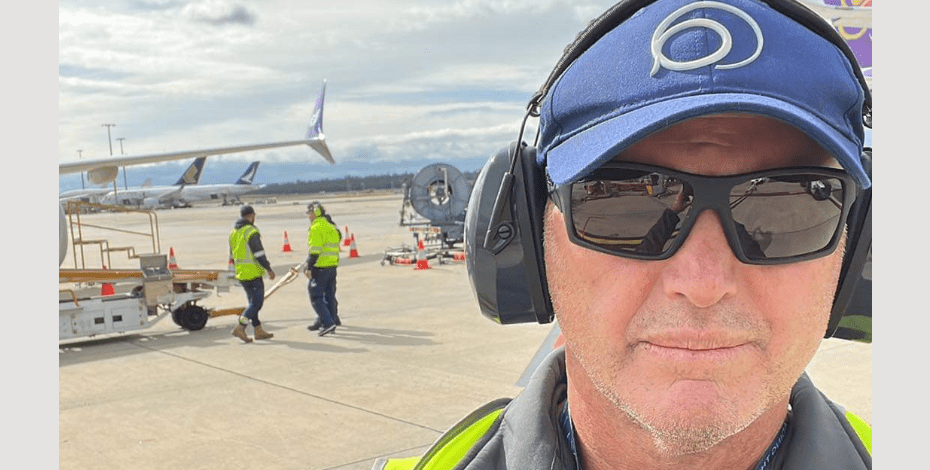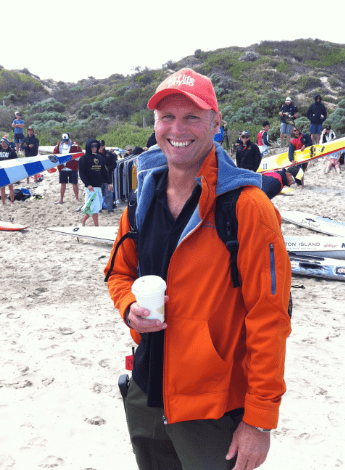
From surf to tarmac

APA PEOPLE Troy Eady began his career as a registered nurse and is no stranger to adaptation. Passionate about health and sport in equal measure, Troy became a physiotherapist and volunteered with Shaw and Partners Iron Series and Surf Life Saving Australia events for years before switching gears once again.
Graduating as a registered nurse and working in the busy public health system, Troy Eady APAM found himself yearning for a very different test of his stamina.
The role wasn’t quite the right fit for him so Troy quit his job and became a garbage collector, enabling him to run the streets of Sydney emptying rubbish bins as part of his training for his true passion—the Shaw and Partners Iron Series (then known as the Nutri-Grain Ironman competition).
The super-fit and keen athlete gave it his all for a few years, competing in several Iron Series events before forging a new path.
‘I went back and studied physiotherapy, knowing that I wanted to be more involved in sport—sport was my focus.
'I was training fairly hard at that stage to try to be an Ironman myself and I was on the surf club circuit,’ Troy says.
‘That’s why I got a job as a garbo—that was my running training.’
Troy’s first job after graduating as a physiotherapist from the University of Sydney in 1996 was with Rugby League club the Illawarra Steelers, working with elite athletes in an environment he loved.
After working with the players for a year, Troy switched gears again and moved up to the Central Coast of New South Wales to enjoy its expansive beaches and surf lifestyle and to get involved in volunteering as a physiotherapist on the Surf Life Saving Australia competition circuit.
Having worked for Surf Life Saving Australia as a medical research assistant during his nursing days, researching specific topics for the national medical officer and helping to develop first aid techniques, Troy answered a call-out for a physiotherapist to volunteer at the Surf Life Saving Championships.
He was welcomed into the fold and would travel to the Gold Coast for a week to work in the first aid area at the championships, helping out by treating competitors for injuries.
‘Perhaps not surprisingly, the athletes get a lot of overuse injuries in their shoulders.
'It’s predominantly an upper limb sport. But they also get a lot of rolled ankles and injured knees from uneven ground and from running in and out of the surf.
'As the physio, you could see a whole range of things, from a wry neck from an aeroplane flight to a standard overuse injury that had been bubbling along for the six months leading up to a competition,’ says Troy.
In 1999 Troy was asked to travel with the Surf Life Saving team to Western Australia for what was then known as the Tri Nations
Challenge between South Africa, New Zealand and Australia.
He would go on to work at 19 of these events, travelling all around the world, including to New Zealand twice a year and to competitions in Daytona (United States), Italy, France and South Africa.
He funded all his volunteer work by working part-time as a physio in a private practice, fitting in clients around his travelling and competition schedules.
Passionate about sport and sporting competitions for as long as he can remember, Troy has experienced both sides of the coin as a competitor and as someone who treats competitors.

Troy Eady volunteering as a physiotherapist with Surf Life Saving at one of its many events.
He has been competing in Surf Life Saving events on and off for 50 years, starting with Nippers as a boy growing up on the north coast of New South Wales.
Troy also competed in the Coolangatta Gold endurance race a few times in his 40s, ranking in the top 10 in his age group.
‘A very long time ago I did a couple of seasons in the Ironman series but across the board I’m not a superstar athlete, just a participant,’ he says.
‘Last season I found myself doing a couple of double ski races with my daughter so that’s a nice aspect of Surf Life Saving competition—it keeps me active and motivated to stay fit.
'I was a country club competitor for the majority of my competitive years so competing at Aussies [national level] was well beyond my ability.
'It was only in my later years that I did a few races, without success, at Aussies.
'My main involvement in Aussies was as the physiotherapist coordinator for the first aid team, which I did for probably 10 years.’
Eventually relocating to the Gold Coast and opening his private practice, Surf Life Physio, with his business partner Nick Marshall MACP, Troy realised that although he was deeply passionate about his volunteering work with Surf Life Saving and with the Iron Series, for which he received a small stipend, he needed to earn a living and support his family.
‘I worked in private practice on the Central Coast until 2009 and then we opened a practice on the Gold Coast to move closer to that athletic base and we still have the Gold Coast practice now,’ Troy says.
‘I’ve made poor choices when it comes to my professional income and trying to make money out of being a sports physio by choosing a volunteer sport.
‘My business partner is now travelling with that team and has been for some time.
'One of the young blokes in our practice is also travelling with the youth team, doing the same sort of thing.
'But I needed to earn a dollar and I had dabbled in occupational physiotherapy throughout my private practice lifetime so it made sense that I would try to capitalise on that.’
Troy set about pursuing further education in occupational physiotherapy and completed his Occupational Health Physiotherapy Levels 1, 2 and 3 through the APA, of which he has been a member since 1995.
As luck would have it, Troy took on the owner of an aviation ground handling company as a patient and it opened the door to his current career working in the aviation industry.
Through his business Troy Health Group, Troy now works primarily with ground crews who handle baggage at airport terminals across the country.
While it’s a far cry from the sand and surf of his previous work, Troy finds his current role with baggage handlers immensely satisfying.
He says the work today also calls on his skills in helping people to manage high physical workloads.
With the average suitcase weighing 20 kilograms, 40 suitcases filling one steel can (averaging around 800 kilograms) and three steel cans loaded into each aircraft, it’s a lot of manual work for each of the baggage handlers over the average shift.
‘They can load two and a bit tonne on, they take two and a bit tonne off and they turn half a dozen flights each shift. On average they’re probably each still throwing around six tonne of bags per shift.
'They get plenty of time to do that, there’s plenty of breaks and they are part of a team so the load is spread,’ says Troy.
‘My job has traditionally been to ensure that they use the best possible technique to try to minimise that cumulative load.
'That means eliminating things like double handling, for example.
'Rather than putting the bag down on the ground and then picking it back up to put it in a can, it’s about moving it from one spot to the next in one movement.’
Regularly working at Gold Coast and Brisbane Airports, Troy is also flown to other airports around the country to watch, advise and educate baggage handlers on how best to minimise risk and to provide them with best practice injury prevention and management tools.
Applying occupational and sports injury mitigation and management models, Troy has helped aviation companies decrease injury risk, minimise lost time injury and maximise the physical health of their workforce.
Troy blends his work in the aviation industry with working at the private practice by carefully managing his schedule.
Starting at 6 am each weekday, he completes a 2.5-hour block of paperwork and documentation obligations before heading out to fulfil that day’s duties.
In the evenings Troy does another block of administration work before he coaches his daughter on the surf ski.
The father and daughter duo enjoy an active participation in sport and have for many years (‘She’s pushing me along pretty hard at the moment; I’m struggling to keep up!’).
Recently Troy stepped down from his position as one of several non-Indigenous members of the APA’s Aboriginal and Torres Strait Islander Health Committee.
He was on the committee for a few years after volunteering as a physiotherapist with the National Aboriginal and Islander Skills Development Association’s Dance College when he lived on the Central Coast.
Once he moved to the Gold Coast, Troy volunteered his time with the Aboriginal Community Controlled Health Services—something he continues to this day.
Troy has experienced a broad spectrum of the profession and his advice to new graduate physiotherapists is simple.
‘As a business owner I would love to say “Don’t volunteer your time” but as a sports physio I would say “If you want to achieve that elite sport goal, then you need to volunteer to get the credibility to claim an expertise”.
'You’re not going to get that credibility handed to you on a platter; you’ve got to go and fight and work hard for it.’
Recently, Troy was also named a life member of Surf Life Saving Australia - the highest honour bestowed to members for their remarkable contribution to surf life saving.
COURSE OF INTEREST: Aquatic Physiotherapy Level 1-Parts B and C
© Copyright 2025 by Australian Physiotherapy Association. All rights reserved.





